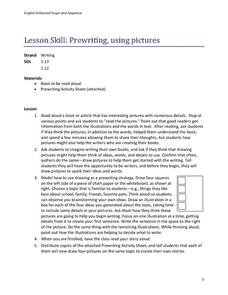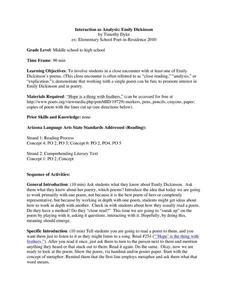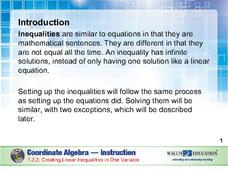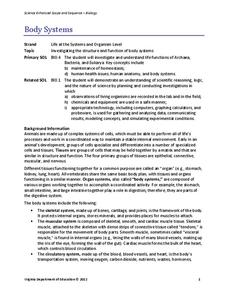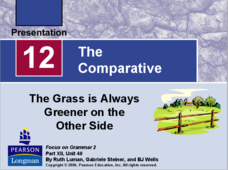Curated OER
It Can Be a Shocker!
It's important for young learners to understand how dangerous electricity can be, and how to avoid getting shocked. This learning exercise enlightens them on how to avoid getting shocked, then has them answer Yes or No to eight questions...
Curated OER
Dandelion Wine: Socratic Seminar
There are “a million things to talk about. . .” in Ray Bradbury’s Dandelion Wine; however, the focus of this socratic seminar is the issue of living and dying. Class members prepare for the discussion by writing about their own views of...
Curated OER
Prewriting, Using Pictures
Young readers practice getting information from both the text and the illustrations found in books they are reading. They see that quite often, authors use pictures to help them get their writing process started. Youngsters are invited...
Curated OER
Interaction as Analysis: Emily Dickinson
Emily Dickinson’s “Hope is a thing with feathers” is the focus of a series of activities that model for learners how close reading can lead to understanding. The whole class plays with the metaphor, groups talk about the author’s...
Curated OER
Culture, Race & Ethnicity
Is there a difference between culture, race, and ethnicity? In order to celebrate Harmony Day and cultural diversity, your class will brainstorm, discuss, and discover that there is. The class splits into three groups, each group is...
Curated OER
Day and Night
Good Night, Moon is a classic little ones absolutely love. It's a sweet book that can be used, as in this lesson plan, to start a conversation about the difference between night and day. After reading the story, the class brainstorms...
Polk Bros Foundation
Picture Planner
Show your class that there is more than one way to communicate an idea. Pupils note down their ideas and then brainstorm a few things they want to include in their pictures. Then, in the box provided, they sketch and describe their...
Kentucky School for the Deaf
Levels of Organization within an Ecosystem
From tiny organisms to entire biomes, young scientists examine the interdependent relationships tying all living and non-living things together with this collection of ecology resources.
K12 Reader
Setting the Scene: Great Expectations
Expect great things from this reading comprehension exercise that asks readers to cite evidence from the provided passages of Great Expectations to support the inference that Charles Dickens' Miss Havisham, and her room, are indeed strange.
Growing Kids Ministry
Useless Junk? or Made with a Purpose?
Demonstrate that all items (and people) have a purpose in God's plan with a Sunday School assignment. After examining seemingly useless items, such as bolts, paper clips, or batteries, kids fill in the blanks to express the item's...
Virginia Middle School Engineering Education Initiative
Save the Penguins: An Introduction to Thermodynamics and Heat Transfer
Heat things up in your physical science class with this interactive lesson series on thermodynamics. Through a series of class demonstrations and experiments, young scientists learn how heat is transferred through conduction, convention,...
BW Walch
Creating Linear Inequalities in One Variable
Just when a young mathematician starts to feel comfortable turning word problems into linear equations, shake things up and throw inequalities in the mix. This excellent, instructive presentation takes the steps for solving an equality...
Teacher's Guide
Nouns for Valentine's Day
Individuals practice classifying nouns as a person, place, or thing by coloring each heart a specific color.
Museum of Disability
Can You Hear a Rainbow?
Teach your class about compassion and empathy with Jamee Riggio Heelan's Can You Hear a Rainbow? As kids read about Chris, a boy who is deaf, they discuss the things he likes to do, as well as the ways he communicates with the world.
Virginia Department of Education
Body Systems
The human body is an amazing thing! Explore the body with your high school class as they investigate each system in detail. They learn components of each organ system and disease processes that can negatively affect general health and...
Willow Tree
Angle Sum Property of Triangles
All triangles have some things in common. Using these properties of triangles, learners find missing angle measures. Scholars use the Angle Sum Property and properties of special triangles throughout the lesson.
EngageNY
Construct and Apply a Sequence of Rigid Motions
Breaking the rules is one thing, proving it is another! Learners expand on their previous understanding of congruence and apply a mathematical definition to transformations. They perform and identify a sequence of transformations and use...
Code.org
Introduction to Arrays
How can you store lists in a computer program? The 16th installment of a 21-part unit introduces arrays as a way to store lists within a variable. Individuals program a list of their favorite things—adding interest to the activity.
Pearson
The Comparative
A lecture on comparative adjectives is good, but an engaging presentation is better! Take learners through the rules of comparing one thing to another with a slideshow about how some experiences can be better or worse than others.
University of Southern California
What Lives In The Ocean?
One of the most diverse environments on Earth is the ocean. Young scientists explore the living things found in the ocean during an exciting seven-lesson unit. Their study includes organisms from plankton to invertebrates and vertebrates...
University of Southern California
Human Impact on the Sea
How far does the human hand reach? Five interactive lessons lead classes through a unit exploring the human impact on ocean resources, pollution, and even extinction. Learners discover how their decisions affect the ocean environment...
Nuffield Foundation
Measuring Respiratory Quotient
How do scientists prove tiny living things respire? Young scientists build a respirometer and measure respiration rates in living creatures. By comparing the measurements of both plants and animals, they understand the similarities.
Magic of Physics
Scale of the Universe I
From quantum foam to the universe itself, plus everything in between, what is the scale of the world around us? Inquisitive physicists grapple with the proportions of all things great and small using a fascinating interactive. Scholars...
Smithsonian Institution
Our Story: Duke Ellington and Jazz
Get parents or guardians into the swing of things with a jazzy homework assignment. A detailed six-page guide provides before, during, and after reading suggestions for Duke Ellington: The Piano Prince and His Orchestra, Andrea Davis...
Other popular searches
- Where the Wild Things Are
- Living and Non Living Things
- Living Things
- Things Fall Apart
- Living and Non Living Things
- Classify Living Things
- Living Organisms
- Grouping Living Things
- Favorite Things Survey
- How Things Work
- Basic Needs of Living Things
- The Things They Carried




